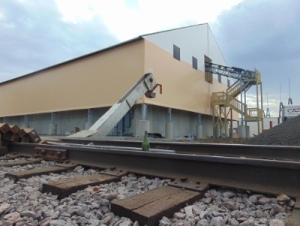Dec 10 2015
"A snow year, a rich year," goes an English proverb. States across the US – whose expenses due to impassable roads can reach $300-700 million per day – might disagree. To cope with annual snowfalls that range from 36 inches in southwestern Minnesota to 70-plus inches in areas near Lake Superior, strategically storing salt in sufficient quantities across Minnesota is essential to keep highways clear.
 Fabric salt storage structure for Northern Salt, St. Paul, Minnesota. Photo by Legacy Building Solutions.
Fabric salt storage structure for Northern Salt, St. Paul, Minnesota. Photo by Legacy Building Solutions.
When Northern Salt, a St. Paul supplier of commercial and industrial deicing salt, outgrew its previous steel structure, it enlisted its fellow Minnesotans at South Haven-based Legacy Building Solutions to design and build a 12,800-sq.-ft. fabric storage building. The new building will hold 10,000 tons of salt, which Northern Salt sells to counties, cities, townships, and commercial businesses throughout the region.
One reason Northern Salt was drawn to the fabric solution was the material's resistance to corrosion. Salt, a natural chemical catalyst, is highly corrosive. For the framing in this project, Legacy used a hot dip galvanized solid steel frame, which is much longer lasting in a corrosive environment than the open web trusses traditionally used in fabric structures. Other factors in the decision to choose a Legacy fabric structure were value for money and ease of installation – the structure took just ten days to build.
"Legacy's customization options were impressive, too," said O.J. Rinehart, CEO and Founder of Northern Salt. "Our salt is delivered from our suppliers by rail cars to a large pit next to the storage structure. A conveyor system hoists it from pit to building. Legacy was the only company we talked to that could supply trusses strong enough to support the conveyors."
The above-grade piers, precast concrete walls, and high fabric termination follow the Minnesota Department of Transportation's standards for salt storage structure designs. The precast concrete walls provide multiple benefits. They increase storage capacity by reducing the pressure of the salt on the fabric. Because they are modular, they can be reconfigured; and as they can be sold, they are not a sunk cost. The precast walls allow the fabric to stop a few feet above ground, which saves money and invites airflow – crucial in corrosive environments.
The brutal winters of 2013 and 2014 left salt sheds across the country prematurely empty. Northern Salt's enhanced capacity will give it a leg up over its competitors: It is the only salt distribution company in the Twin Cities open around the clock during snowstorms.